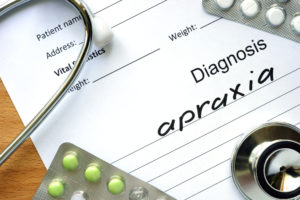
When you receive a diagnosis of apraxia for your child, you may be wondering can a child outgrow apraxia? For a child with apraxia, the most common treatment is the use of speech-language pathologists, with treatments up to several times per week. Children rarely would simply outgrow this condition without treatment.
In addition to the treatments, many speech therapists would recommend working on alternative communication methods, receiving treatment for any related health problems, and providing support to the child’s emotional needs.
Understanding Childhood Apraxia of Speech
Apraxia is a type of speech disorder that is with the child at birth, even if the language problems do not become obvious for a couple of years. With apraxia, the child will have difficulty consistently making the sounds that are part of speech.
Approximately 1 to 2 children in 1,000 will develop apraxia, according to a study by Penn State College of Medicine.
Apraxia differs from other types of speech problems in that it represents issues with the motor coordination of speech. In other words, the part of the brain that controls speech cannot send the signals to the lips, tongue, and mouth to make the sounds properly.
It does not mark a problem with the mouth or muscles that generate speech. It is a brain disorder.
"If your child was born with a birth injury, or cerebral palsy, we can help."
Treatment for Apraxia
According to Cedars Sinai, the treatment of childhood apraxia of speech involves speech language therapy. The therapy sometimes involves a classroom setting with multiple speech therapy students, although a one-on-one therapy session is more common.
Some children respond to therapy better than others, but the majority of therapists will recommend three to five therapy sessions per week early in the treatment process.
While therapy is occurring, children diagnosed with apraxia may need to come up with different ways to express themselves for a bit of time. The child may learn basic sign language or may carry a picture book to help express certain words to other people. The hope is that, through therapy, the use of these other methods of communication will not be needed in the future.
Potential Causes of Apraxia
Researchers do not fully agree on a single cause for a child developing apraxia. Researchers have used varying imaging techniques to study the brains of children with apraxia, but they have not found significant physical differences in the brain structure that could explain the condition.
Commonly, other health conditions and situations related to brain development are also present in a child that develops apraxia.
Autism
According to Centers for Disease Control and Prevention (CDC), 1 in 54 children develop a condition that appears on the autism spectrum disorder. Not all children with autism also develop apraxia, but this disorder does seem to appear in children with autism with some frequency.
Autism is a developmental disability that affects the ability of the child to communicate, while also creating behavioral issues and challenges in making social connections.
Cerebral Palsy
Cerebral palsy (CP) is a motor disorder that affects a person’s ability to move and control balance. The CDC says 1 in 345 children in the United States have cerebral palsy.
Although the most obvious sign of cerebral palsy involves motor function issues, children with CP also may have issues with vision, hearing, and speech.
Epilepsy
Epilepsy is a brain disorder that can create a number of issues in children and adults alike. Once a person has two or more seizures, he or she could be diagnosed with epilepsy, as a seizure is the primary symptom of this condition.
Brain infections and brain injuries can lead to epilepsy, which can manifest itself in speech problems.
Traumatic Brain Injury
Someone who has suffered a traumatic brain injury has the possibility of being diagnosed with apraxia, as well as a number of other serious health conditions.
During the birthing process, it is possible that the newborn will suffer a traumatic brain injury because of the negligence of a doctor or another person caring for the baby during and after the birth.
If a doctor improperly uses forceps to aid in the vaginal birth, for example, he or she could apply too much pressure, leading to a brain injury.
"We know first-hand what you are going through."
Contact Our Office for a Free Birth Injury Case Review
So can a child outgrow apraxia? The chances of this occurring are small. It is far more common for the child to need to undergo frequent therapy sessions with a speech-language pathologist, as well as receive other forms of support.
If you believe that a doctor’s negligence played a role in the diagnosis of apraxia for your child, you have the right to seek compensation for your family’s medical bills, pain, and suffering.
Call the Birth Injury Lawyers Group at (800) 222-9529 today for a free review of your situation. We will study the facts and help you determine the strength of your case. If you choose to hire us, we will work tirelessly on behalf of your family to help you receive the fairest possible settlement.
"We are committed to helping families who have suffered medical negligence."
